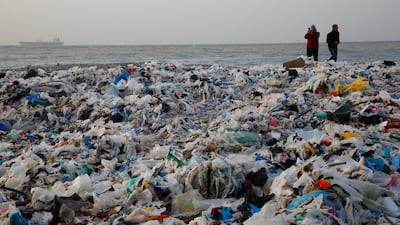Gulf states are working towards a zero landfill target for reducing plastics wastage by 2040, to match European timelines, according to the head of a regional petrochemicals association.
"I think that by 2040, we can reach something similar to Europe, but that would require concerted, collective effort from many players. We all should buy in to this, its optimistic target, I believe it's doable," said Abdulwahab Al Sadoun, secretary general of the Gulf Petrochemicals and Chemicals Association (GPCA) told The National in Dubai.
The mainly oil producing countries of the Middle East, which account for 35 per cent of world output, have diversified into multibillion dollar petchems ventures to boost revenue streams. The Gulf petchems industry today is valued at $25bn and accounts for 12 per cent of global market share. While about 3.5 to 4 million of the output, which GPCA last year pegged at 30 million tonnes consumed domestically, much of the production — about 80 to 85 per cent — goes to export markets, mainly in China and Asia.
Domestic demand in the region is growing on the back of rising population as well as growing use by industries such as aviation and other transport.
With this increase in consumption, the region has also begun to grapple with the problem of wastage, as only 8 per cent is currently being recycled regionally.
"The rest is ending either in landfill or incinerated, which is a big loss," Mr Al Sadoun said.
"This is a wasted opportunity for recycling, capturing the value of plastics, given that some of the plastic is 100 per cent recyclable, like [mineral water] bottles," he said.
_______________
Read more:
Adnoc confirms increased focus on downstream industry
Dubai restaurants 'stop sucking' in bid to reduce plastic waste
_______________
GPCA, which represents the downstream hydrocarbons industry in the region, is in talks with regulators in the industry to move towards a target similar to Europe.
"In other developed regions, they have set targets," Mr Al Sadoun said. "For instance, Europe by 2040 aims to have zero landfill plan but we’re not yet there. We hope that together with the regulator we can set it up for achieving such zero landfill.” he said.
Europe, which recycles 35 per cent of its plastics, is waging war its war on polymers in two phases. The European Union is working to reach its 60 per cent target for reuse and recycling of plastic packaging by 2030, with 100 per cent earmarked by 2040. European organisations from the polymers sector have also embraced the bloc’s push for waste reduction and announced voluntary commitments in January to reach 50 per cent plastics waste recycling by 2040.
In the Middle East, dumping of plastics remains a sensitive issue , with the capacity to cause social unrest, as in the case of Lebanon where a mountain of unrecycled plastic washed ashore this year added to its festering crisis over uncollected rubbish.
In the GCC, companies such as Sharjah-headquartered Bee'ah have begun recycling plastic, including car tyres, which are transformed into jogger tracks and rubber tiles.
Last October Saudi Arabia's Public Investment Fund, the kingdom's sovereign wealth fund, also launched a recycling company, with the aim of reprocessing 85 per cent of the country’s recyclable wastes, currently being dumped in landfills.
The kingdom, which has the region's highest capacity for petrochemical production, is estimated to generate about 50 million tonnes of plastic waste a year, of which 40 per cent is produced in the eastern metros of Riyadh and Dammam and the Red Sea port city of Jeddah alone.


